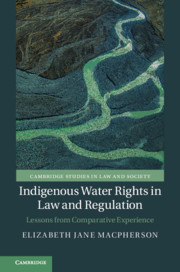Book contents
- Indigenous Water Rights in Law and Regulation
- Cambridge Studies in Law and Society
- Indigenous Water Rights in Law and Regulation
- Copyright page
- Dedication
- Contents
- Acknowledgements
- Chapter One Introduction
- Part I Conceptualising Indigenous Water Rights
- Part II Comparative Country Studies
- Chapter Four The Limited Recognition of Indigenous Water Rights in Australia
- Chapter Five Water Rights for Māori in Aotearoa New Zealand
- Chapter Six Rivers as Subjects and Indigenous Water Rights in Colombia
- Chapter Seven Recognising and Allocating Indigenous Water Rights in Chile
- Part III Lessons Learnt
- Glossary
- Bibliography
- Index
- Cambridge Studies in Law and Society
Chapter Five - Water Rights for Māori in Aotearoa New Zealand
from Part II - Comparative Country Studies
Published online by Cambridge University Press: 20 July 2019
- Indigenous Water Rights in Law and Regulation
- Cambridge Studies in Law and Society
- Indigenous Water Rights in Law and Regulation
- Copyright page
- Dedication
- Contents
- Acknowledgements
- Chapter One Introduction
- Part I Conceptualising Indigenous Water Rights
- Part II Comparative Country Studies
- Chapter Four The Limited Recognition of Indigenous Water Rights in Australia
- Chapter Five Water Rights for Māori in Aotearoa New Zealand
- Chapter Six Rivers as Subjects and Indigenous Water Rights in Colombia
- Chapter Seven Recognising and Allocating Indigenous Water Rights in Chile
- Part III Lessons Learnt
- Glossary
- Bibliography
- Index
- Cambridge Studies in Law and Society
Summary
In Chapter 5 I consider water rights for Maori in Aotearoa New Zealand. Pursuant to a settlement between Whanganui Iwi and the Crown, made in 2017, the Whanganui River was recognised as ‘Te Awa Tupua’ (‘an indivisible and living whole, incorporating all its physical and meta-physical elements’), declaring the River to be a ‘legal person’. The arrangement accords certain guardianship and governance rights, but not property rights, to the Maori people that traditionally owned the River. However, Maori continue to agitate at a national level, both politically and before courts and tribunals, for the right to ‘own’ their water resources, amid cautious government plans for water law reform. The New Zealand study raises interesting questions about the nature of water in law; as a private right to be held and allocated, or a public interest incapable of ownership. Maori are seeking both recognition of their distinctive water relationships and influence and control over water governance and a substantive share of the consumptive pool of water for any purpose including economic development. The study of Maori rights to water in this chapter demonstrates the variability of indigenous water demands, and a need for multifaceted responses to indigenous water exclusion.
Keywords
- Type
- Chapter
- Information
- Indigenous Water Rights in Law and RegulationLessons from Comparative Experience, pp. 99 - 130Publisher: Cambridge University PressPrint publication year: 2019
- 1
- Cited by



